
The idea for the department was suggested by the daily pet column in the New York Evening Post, and by several others.

Q. I enclose a sketch of the way my dog, William, has been lying for two days now. I think there must be something wrong with him. Can you tell me how to get him out of this?
Mrs. L. L. G.
A. I should judge from the drawing that William is in a trance. Trance states, however, are rare with dogs. It may just be ecstasy. If at the end of another twenty-four hours he doesn’t seem to be getting anywhere, I should give him up. The position of the ears leads me to believe that he may be enjoying himself in a quiet way, but the tail is somewhat alarming.
Q. My husband, who is an amateur hypnotizer, keeps trying to get our bloodhound under his control. I contend that this is not doing the dog any good. So far he has not yielded to my husband’s influence, but I am afraid that if he once got under, we couldn’t get him out of it.
A. A. T.
A. Dogs are usually left cold by all phases of psychology, mental telepathy, and the like. Attempts to hypnotize this particular breed, however, are likely to be fraught with a definite menace. A bloodhound, if stared at fixedly, is liable to gain the impression that it is under suspicion, being followed, and so on. This upsets bloodhound’s life by completely reversing its whole scheme of behavior.
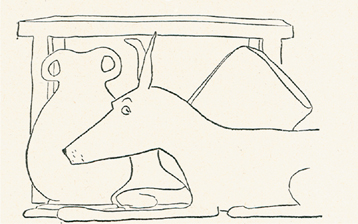
Q. My police dog has taken to acting very strange, on account of my father coming home from work every night for the past two years and saying to him, “If you’re a police dog, where’s your badge?,” after which he laughs (my father).
Ella R.
A. The constant reiteration of any piece of badinage sometimes has the same effect on present-day neurotic dogs that it has on people. It is dangerous and thoughtless to twit a police dog on his powers, authority, and the like. From the way your dog seems to hide behind tables, large vases, and whatever that thing is that looks like a suitcase, I should imagine that your father has carried this thing far enough—perhaps even too far.
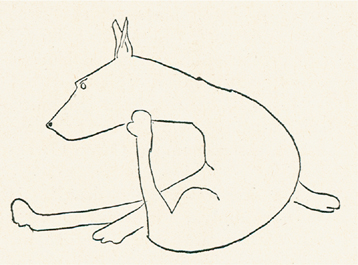
Q. The fact that my dog sits this way so often leads me to believe that something is preying on his mind. He seems always to be studying. Would there be any way of finding out what this is?
Arthur
A. Owing to the artificially complex life led by city dogs of the present day, they tend to lose the simpler systems of intuition which once guided all breeds, and frequently lapse into what comes very close to mental perplexity. I myself have known some very profoundly thoughtful dogs. Usually, however, their problems are not serious and I should judge your dog has merely mislaid something and wonders where he put it.
Q. No one has been able to tell us what kind of dog we have. I am enclosing a sketch of one of his two postures. He only has two. The other one is the same as this except he faces in the opposite direction.
Mrs. Eugenia Black
A. I think that what you have is a cast-iron lawn dog. The expressionless eye and the rigid pose are characteristic of metal lawn animals. And that certainly is a cast-iron ear. You could, however, remove all doubt by means of a simple test with a hammer and a cold chisel, or an acetylene torch. If the animal chips, or melts, my diagnosis is correct.
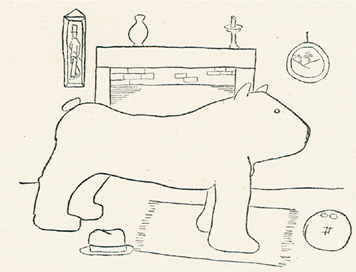
Q. Mr. Jennings bought this beast when it was a pup in Montreal for a St. Bernard, but I don’t think it is. It’s grown enormously and is stubborn about letting you have anything, like the bath towel it has its paws on, and the hat, both of which belong to Mr. Jennings. He got it that bowling ball to play with but it doesn’t seem to like it. Mr. Jennings is greatly attached to the creature.
Mrs. Fanny Edwards Jennings
A. What you have is a bear. While it isn’t my bear, I should recommend that you dispose of it. As these animals grow older they get more and more adamant about letting you have anything until finally there might not be anything in the house you could call your own—except possibly the bowling ball. Zoos use bears. Mr. Jennings could visit it.
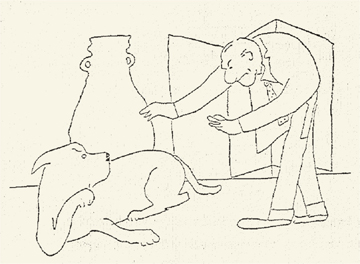
Q. Sometimes my dog does not seem to know me. I think he must be crazy. He will draw away, or show his fangs, when I approach him.
H. M. Morgan, Jr.
A. So would I, and I’m not crazy. If you creep up on your dog the way you indicate in the drawing, I can understand his viewpoint. Put your shirt in and straighten up; you look as if you had never seen a dog before, and that is undoubtedly what bothers the animal. These maladjustments can often be worked out by the use of a little common sense.
Q. I have three Scotch terriers which take things out of closets and down from shelves, etc. My veterinarian advised me to gather together all the wreckage, set them down in the midst of it, and say, “Ba-ad Scotties!” This, however, merely seems to give them a kind of pleasure. If I spank one, the other two jump me—playfully, but they jump me.
Mrs. O. S. Proctor
A. To begin with, I question the advisability of having three Scotch terriers. They are bound to get you down. However, it seems to me that you are needlessly complicating your own problem. The Scotties probably think that you are trying to enter into the spirit of their play. Their inability to comprehend what you are trying to get at will in the end make them melancholy, and you and the dogs will begin to drift farther and farther apart. I’d deal with each terrier, and each object, separately, beginning with the telephone, the disconnection of which must inconvenience you sorely.
| 1930 |
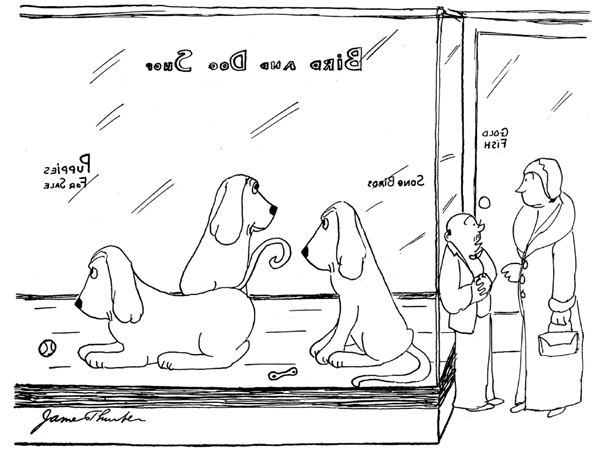
“I’m very sorry, Madam, but the one in the middle is stuffed, poor fellow.”